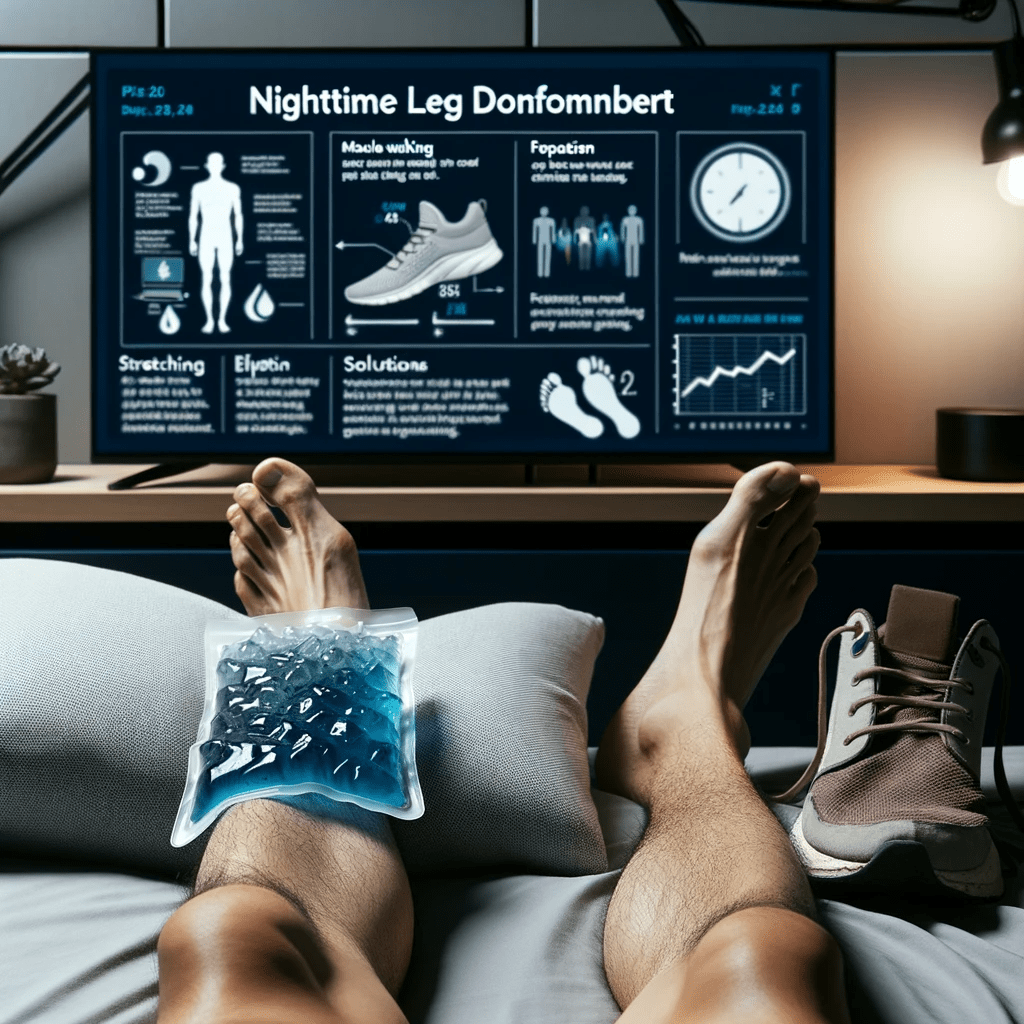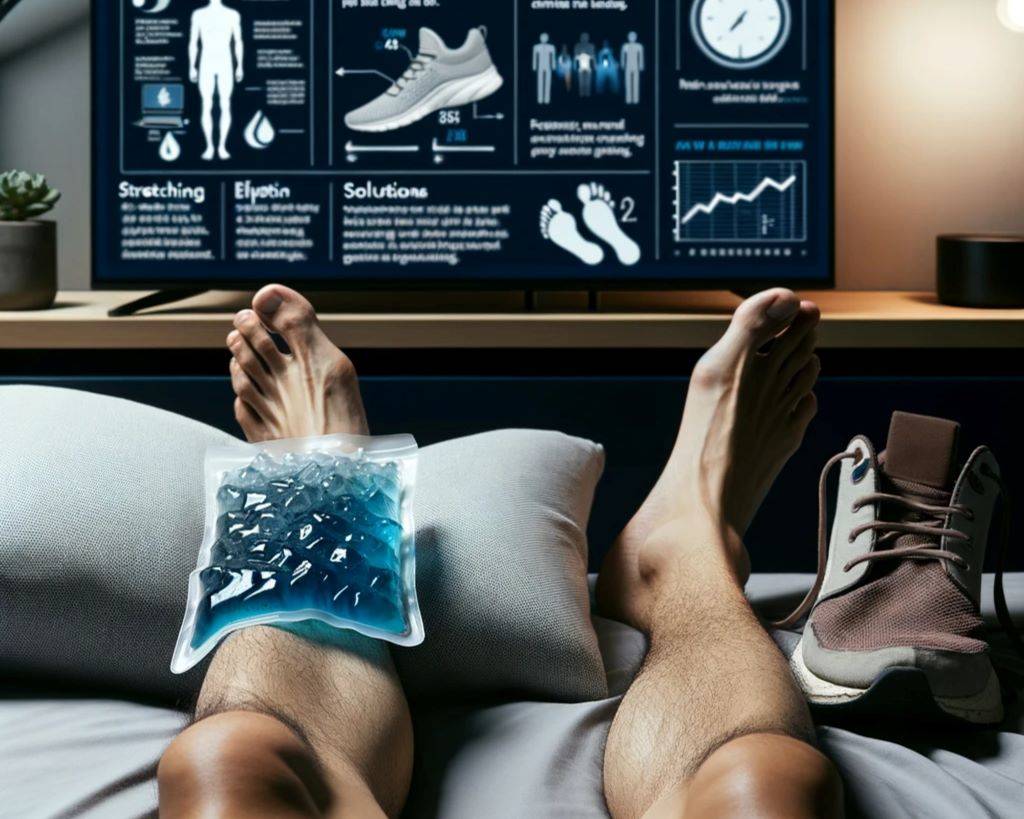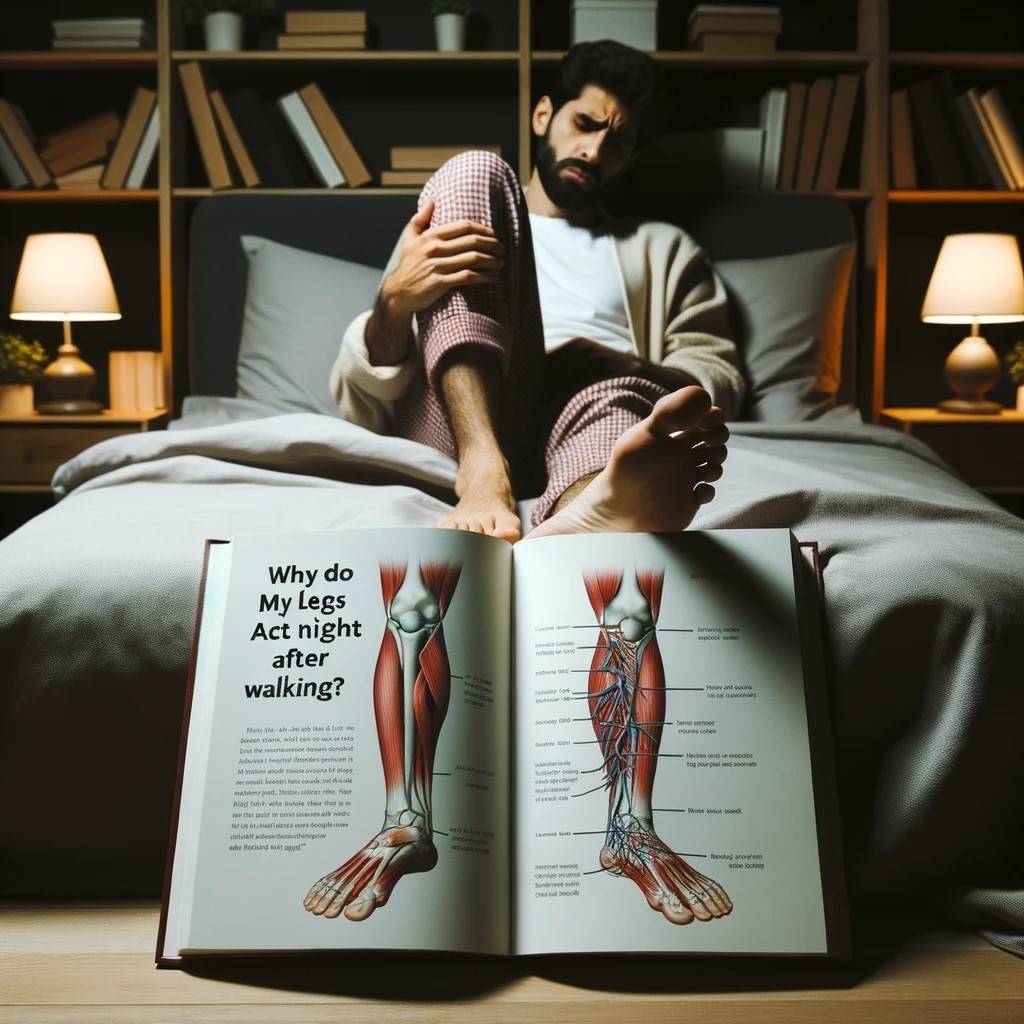Discover a comprehensive insight into “Why Do My Legs Ache at Night After Walking?” Uncover the reasons and solutions for nighttime leg discomfort.
Introduction to Why Do My Legs Ache at Night After Walking


Walking is a universal exercise, touted for its myriad health benefits. From cardiovascular health to mental well-being, walking can be an elixir for many. Yet, some walkers often find themselves grappling with the question: “Why do my legs ache at night after walking?”. In this comprehensive guide, we explore the reasons behind this discomfort, offering insights and solutions.
The Science Behind Achy Legs at Night
Our legs, comprising a complex network of muscles, tendons, ligaments, and bones, are marvels of human engineering. They carry our weight, propel us forward, and sustain our activities. So, it’s not surprising that they occasionally protest.
- Overexertion: Think of your muscles as elastic bands. During a walk, especially a long or intense one, these bands stretch. This causes microscopic tears. While these tears help muscles grow stronger, they can also result in temporary discomfort.
- Poor Circulation: Blood circulation can sometimes be compromised after prolonged activity, leading to a sensation of heaviness or pain in the legs.
- Restless Leg Syndrome (RLS): As per Johns Hopkins Medicine, RLS, a neurological disorder, can intensify post-walk. The disorder’s hallmark is an irresistible urge to move the legs, especially during periods of rest.
- Medication Side-effects: Some medications, especially those targeting the nervous system, list muscle discomfort as a side effect.
Should You Worry About Achy Legs?
Occasional discomfort is benign, signalling a workout. But, as the saying goes, it’s safe than sorry.
- If you experience severe pain, swelling, or redness, or if the discomfort persists for several days, it’s imperative to consult a healthcare professional.
Fact: A study found that ignoring persistent leg pain can sometimes lead to complications, especially if there’s an underlying health condition.
Possible Underlying Medical Conditions
While post-walk leg aches are usually harmless, they might sometimes indicate more serious health issues:
- Deep Vein Thrombosis (DVT): Characterized by a blood clot in a deep vein, DVT usually occurs in the legs. Symptoms include swelling, warmth, and pain.
- Peripheral Artery Disease (PAD): PAD results from narrowed arteries, reducing blood flow to your limbs. This can cause leg pain, especially during physical activities.
- Arthritis: A common ailment in older adults, arthritis causes joint inflammation, leading to pain.
- Sciatica: Originating in the lower back, sciatica pain travels down the leg because of pressure on the sciatic nerve.
Vitamin Deficiencies and Leg Pain
Often overlooked, vitamin deficiencies can be silent culprits behind leg pain:
- Vitamin D: Essential for bone health, a deficiency can lead to bone pain and muscle weakness.
- Vitamin B12: A deficiency can lead to nerve damage, causing pain and numbness in the legs.
- Magnesium: Vital for muscle function. Low magnesium levels can result in cramps.
Quote: “Many of us are unaware of how closely our diet is linked to our overall well-being. Something as simple as ensuring adequate vitamin intake can drastically improve our health.” – Dr Emily Roberts, Nutritionist.
Effective Remedies for Why Do My Legs Ache at Night After Walking

Why Do My Legs Ache at Night After Walking?” is a common question that many people ask, especially after long periods of activity or walking. The discomfort can be caused of various reasons, such as muscle fatigue, dehydration, or underlying medical conditions. Here’s a guide on how to treat and prevent this discomfort:
-
Stretching:
- Post-walk Stretching: Always stretch your legs after walking. Focus on the calf muscles, hamstrings, and quadriceps. Gentle stretching can help relieve muscle tightness and prevent cramps.
-
Hydration:
- Drink Water: Ensure you’re well-hydrated before, during, and after walking. Dehydration can lead to muscle cramps.
- Electrolytes: Consider drinks with electrolytes if you’ve been walking for an extended period, especially in hot weather. This can help balance the minerals in your body that affect muscle function.
-
Proper Footwear:
- Supportive Shoes: Wear shoes that offer good arch support and cushioning. This can reduce the strain on your legs and feet.
- Consider Orthotics: If you have foot problems or flat feet, consider getting custom orthotics to support your arch and disperse pressure.
-
Compression Wear:
- Socks and Sleeves: Consider wearing compression socks or calf sleeves. They can improve blood circulation and reduce swelling, which may help in reducing discomfort.
-
Elevation:
- Rest with Legs Elevated: After walking, lie down and elevate your legs above heart level. This can help reduce swelling and improve blood circulation.
-
Warm Bath:
- Soak in Warm Water: A warm bath with Epsom salts can help relax tight muscles and alleviate pain.
-
Pain Relievers:
- Over-the-counter medication: Non-prescription pain relievers like ibuprofen or acetaminophen can help reduce pain and inflammation. However, always consult with a doctor before starting any medication.
-
Massage:
- Gentle Massage: Massaging your legs can help improve blood flow and reduce muscle tightness.
-
Rest:
- Take Breaks: If you’ve been walking for a long time, take regular breaks to rest your legs.
- Listen to Your Body: If your legs are hurting, it might be a sign that you need to slow down or take a break.
-
Consult a Doctor:
- Underlying Medical Conditions: If the pain persists or is severe, consult a doctor. Conditions like peripheral artery disease, restless leg syndrome, or deep vein thrombosis can cause leg pain.
Prevention Tips:
- Build up your walking duration gradually.
- Warm up before walking and cool down afterwards.
- Maintain a healthy weight to reduce strain on your legs.
- Stay active regularly, but also allow your body time to rest and recover.
In conclusion, leg pain after walking can often be prevented and treated with some simple steps and precautions. Always listen to your body, and if the pain persists, seek medical advice.
Case Study

Mark, a 50-year-old marathoner, started experiencing debilitating leg cramps. Incorporating a balanced diet, stretching, and hydration into his routine made a world of difference.
Conclusion about Why Do My Legs Ache at Night After Walking
Walking is a joy, and with a little care, leg aches can be effectively managed or even prevented. Remember, always listen to your body. If something feels off, it’s best to consult a healthcare professional.
Now, I hope you take an overview of our blog post about Why Do My Legs Ache at Night After Walking
Disclaimer: This article is for informational purposes only. Always seek the advice of your physician or another qualified health provider with questions you may have regarding a medical condition.
FAQs about Why Do My Legs Ache at Night After Walking
Is it normal for your legs to ache after walking? It’s common. After a walk, our muscles have been worked, and it’s natural for them to feel a bit sore, especially if you’re not used to it. Think of it as your muscles telling you they’ve had a workout. However, if the pain persists or is severe, it might be an idea to see a doctor.
What can I do to stop my legs from aching at night? There are a few things you can try:
- Elevate your legs: Prop them up on a pillow to reduce swelling.
- Warm bath: Soaking in a warm tub can help relax tense muscles.
- Massage: Gently rub your legs to boost circulation.
- Over-the-counter pain relievers: Always follow the recommended dosage and consult a pharmacist if unsure.
- Stretching: Gentle stretches before bed can help ease muscle tightness.
Should I be worried if my legs hurt at night? Occasional leg pain, especially after activity, is normal. But if you consistently experience severe pain, or if the pain is accompanied by other symptoms like swelling, redness, or warmth, it’s an idea to consult with a doctor. It could be a sign of an underlying condition.
How do I stop my legs from aching after a long walk?
- Stretch: Before and after your walk, do some leg stretches to keep muscles limber.
- Stay Hydrated: Drink plenty of water to help muscle function.
- Wear supportive shoes: Proper footwear can reduce the strain on your legs.
- Take breaks: If you’re going on a long walk, rest occasionally to give your legs a breather.
- Cool down: After your walk, take a few minutes to walk at a slower pace and let your muscles cool down.
Is leg pain a symptom of any disease? Yes, while occasional leg pain can be due to overactivity or muscle strain, consistent or severe leg pain can be a symptom of various conditions, like deep vein thrombosis, arthritis, or peripheral artery disease, among others. If in doubt, always consult a medical professional.
Can too much walking cause leg pain? Indeed, while walking is a great exercise, overdoing it can lead to muscle fatigue or strain, especially if your body isn’t conditioned for long distances. It’s always good to listen to your body and rest when needed.



